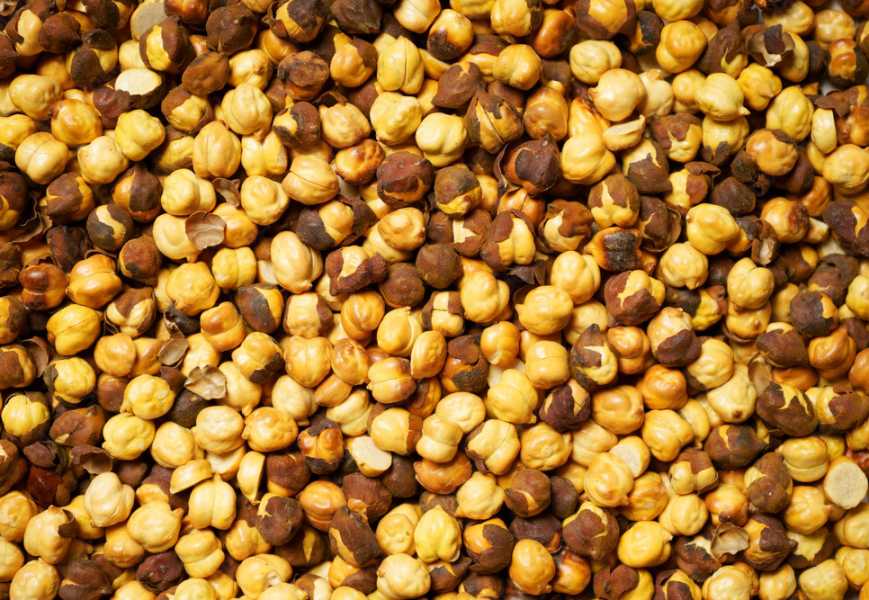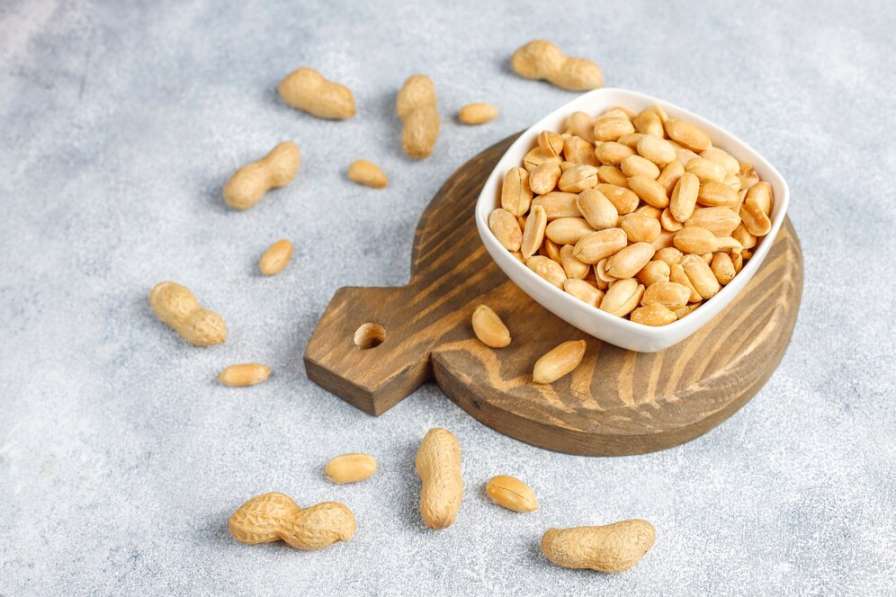Health benefits of seeds
Health benefits of seeds: Seeds, which are frequently neglected as ordinary plant components, have a variety of nutritious riches that can significantly contribute to our general health and well-being. These small, nutritious powerhouses include a variety of important nutrients, healthy fats, and unique bioactive substances. From chia to flax, pumpkin to sunflower, and beyond, the world of seeds offers a wide variety of options that can improve the flavour and nutritional content of our diets.
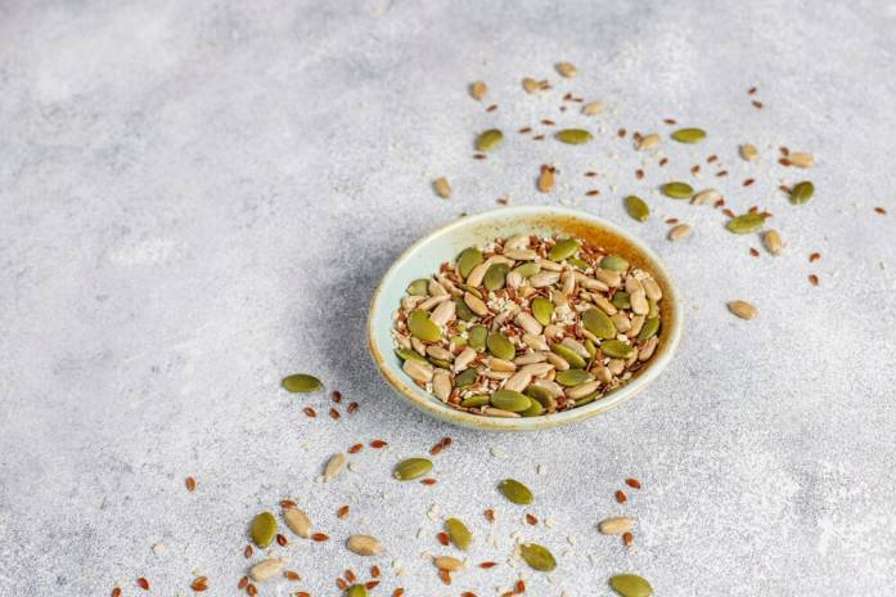
Seeds have proven themselves to be nutritional treasures that should play a significant role in our daily meals. They have many benefits, including the ability to support the immune system, the heart, digestion, and weight control.
Health benefits of seeds are:
1. Flaxseeds
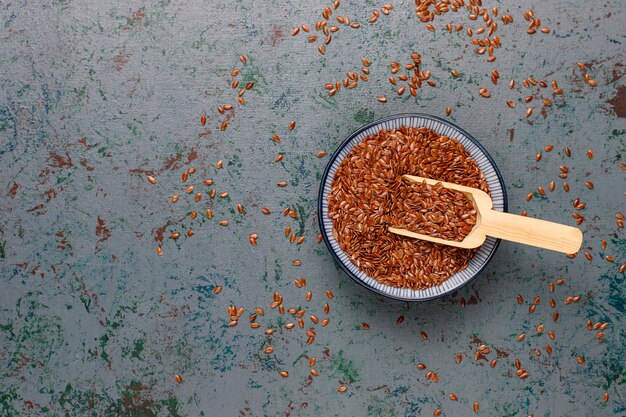
Flaxseeds, sometimes known as linseeds. They’re high in fibre, omega-3 fats, lignans, and vitamins, which are plant compounds with anti-inflammatory qualities. According to research, consuming flaxseeds may help lower cholesterol, keep blood pressure in balance, and potentially lessen the risk of heart disease.
- Lignans for Hormone Balance: According to research, flaxseeds are one of the greatest sources of lignans, a type of plant chemical recognised for its ability to balance hormones. Lignans function as phytoestrogens, which can have both estrogenic and anti-estrogenic effects, helping to maintain hormonal balance in the body. This characteristic has the potential to benefit women’s health, particularly during menopause.
- Omega-3 Fatty Acids: Flaxseeds are an excellent plant-based source of alpha-linolenic acid (ALA), an omega-3 fatty acid. Omega-3 fatty acids are well known for their function in cardiovascular health, as they improve heart rhythm, reduce inflammation, and help to lower blood pressure. Incorporating flax seeds into your diet might be a great way to promote heart health.
- Gut-Friendly Fibre: These seeds are high in soluble and insoluble dietary fibre. The fibre content promotes regular bowel motions, prevents constipation, and promotes a healthy gut microbiota.
- Cholesterol Control: When flaxseeds are mixed with water, the soluble fibre produces a gel-like material that binds to cholesterol and bile acids. This binding process can help minimise cholesterol absorption and support overall cholesterol management.
- Anti-Inflammatory Properties: Flaxseeds contain anti-inflammatory chemicals such as lignans and alpha-linolenic acid. These substances may aid in the reduction of chronic inflammation, which has been linked to a variety of health conditions such as heart disease, diabetes, and certain types of cancer.
- Anti-Inflammatory Properties: Flaxseeds contain anti-inflammatory chemicals such as lignans and alpha-linolenic acid. These substances may aid in the reduction of chronic inflammation, which has been linked to a variety of health conditions such as heart disease, diabetes, and certain types of cancer.
2. Chia seeds
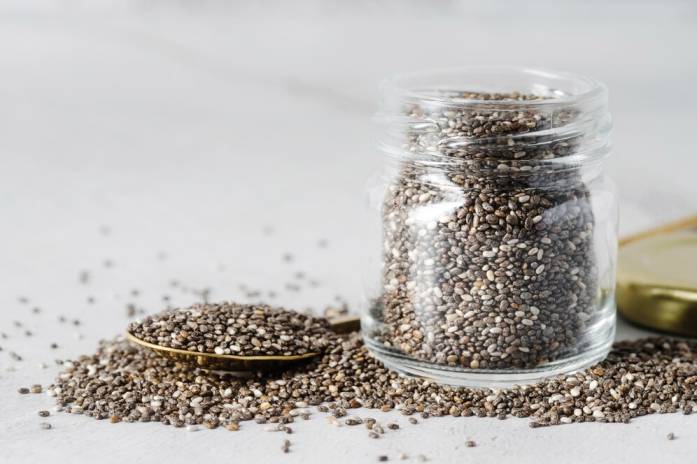
“They have similar nutrients, including omega-3 fatty acids.” Chia seeds, like flaxseeds, are high in disease-fighting plant compounds. As an added bonus, chia seeds may help lower blood sugar levels and regulate blood pressure. Because of their high nutrient content and potential health advantages, chia seeds have gained popularity as a nutritional powerhouse.
- Fibre-rich foods: Chia seeds are a great source of both soluble and insoluble dietary fibre. This fibre content aids in the promotion of regular bowel movements, the prevention of constipation, and the overall health of the digestive system.
Omega-3 Fatty Acids: Chia seeds are a good source of alpha-linolenic acid (ALA), a form of omega-3 fatty acid. Omega-3 fatty acids are essential for reducing inflammation, supporting brain health, and contributing to heart health by lowering blood pressure and cholesterol levels. - Antioxidant Strength: Chia seeds contain antioxidants, which aid in the neutralisation of damaging free radicals in the body. These antioxidants, which include quercetin and chlorogenic acid, help to reduce oxidative stress and promote cellular health.
- Hydration Assistance: Chia seeds can absorb up to 10–15 times their weight in water, generating a gel-like consistency, according to research. This feature aids in the retention of hydration and electrolyte balance, making them a popular choice among athletes for endurance during activity.
- Weight Management: Chia seeds’ mix of fibre and good fats contributes to a sensation of fullness and satiety, which may benefit weight management by lowering overall calorie consumption.
- Plant-Based Protein: Because chia seeds include plant-based protein, they are an excellent choice for vegetarians and vegans wishing to improve their protein intake.
3. Pumpkin seeds
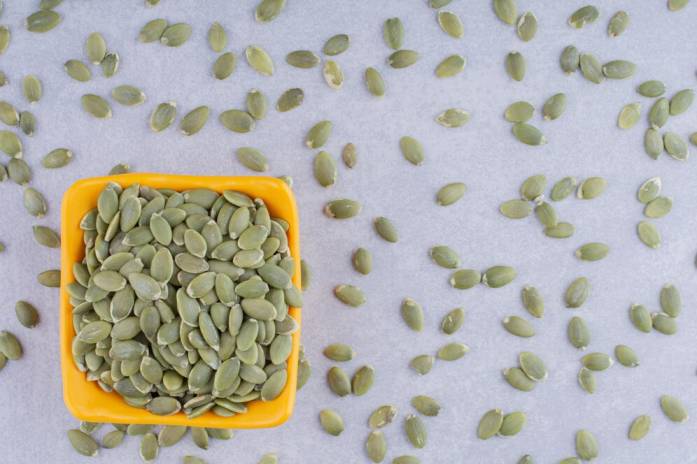
Pumpkin seeds are extremely popular, particularly among children. They’re high in phosphorus and good fats, and they may help decrease cholesterol and enhance heart health. Serve them in salads or roast them with a sprinkle of cinnamon. Let’s look into the fascinating world of pumpkin seeds and discover the remarkable health benefits they provide:
- Magnesium and Zinc: Pumpkin seeds are an excellent source of vital nutrients, including magnesium and zinc. Magnesium is essential for many body activities, including muscle and neuron function, whereas zinc aids in immunological function, wound healing, and DNA synthesis.
- Heart Health and Blood Pressure Regulation: Pumpkin seeds’ magnesium content benefits cardiovascular health by helping to regulate blood pressure levels. Furthermore, their potassium concentration aids in the maintenance of a good cardiac rhythm.
Plant-Based Protein Strength: Pumpkin seeds are high in plant-based protein, making them a good source of protein for vegetarians and vegans. Protein is required for muscle repair, immunological function, and growth in general. - Antioxidant-rich foods: Pumpkin seeds are high in antioxidants, such as vitamin E and different tocopherols and tocotrienols. These antioxidants fight oxidative stress by shielding cells from free radical damage.
- Immune Support and Wound Healing: The zinc concentration of pumpkin seeds helps in the formation of immune cells and antibodies, resulting in a stronger immune system. Zinc is also involved in wound healing
- Phytochemicals for Inflammation: According to research, pumpkin seeds contain anti-inflammatory phytochemicals such as phytosterols and flavonoids. These substances may help in the reduction of inflammation and the risk of chronic illnesses.
- Tryptophan for Sleep and Mood: Pumpkin seeds contain tryptophan, an amino acid linked to serotonin, a neurotransmitter related to mood control and sleep, according to research. Including pumpkin seeds in your diet may help you feel better and sleep better.
4. Sesame seeds
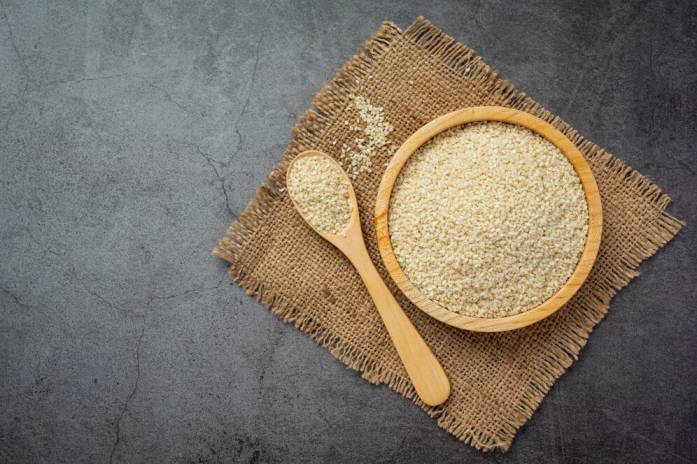
Commonly found on breads, hamburger buns. They’re high in fibre and essential minerals like selenium. They, like flaxseeds, are high in lignans. Unfortunately, sesame seeds are the most commonly allergic seed. These small sesame seeds provide a unique combination of nutrients and potential health benefits. Let us explore the fascinating world of sesame seeds and discover the numerous benefits they provide:
- Calcium for Strong Bones: Sesame seeds are a good source of calcium, a mineral that is necessary for strong bones and teeth. Incorporating sesame seeds into your diet can help with bone health, especially if you follow a dairy-free or low-dairy diet.
- Plant-Based Protein: Despite their small size, sesame seeds are high in protein content. These seeds are a good source of plant-based protein, which is important for tissue repair, muscle function, and overall growth.
- Properties Antioxidant and Anti-Inflammatory: Sesame seeds include antioxidants, which have powerful anti-inflammatory and antioxidant capabilities. These substances help in the fight against oxidative stress and inflammation in the body.
- Heart Health: The monounsaturated and polyunsaturated fats included in sesame seeds contribute to heart health by supporting healthy cholesterol levels and lowering the risk of cardiovascular disease.
- Vitamin B is abundant: B vitamins such as niacin, riboflavin, and thiamine are found in sesame seeds and play important roles in energy metabolism, neuronal function, and overall vitality.
- Mineral Collection: Sesame seeds are high in minerals such as magnesium, zinc, and iron. Magnesium helps in a variety of physical activities, zinc strengthens the immune system; and iron is required for oxygen delivery in the blood.
5. Sunflower seeds
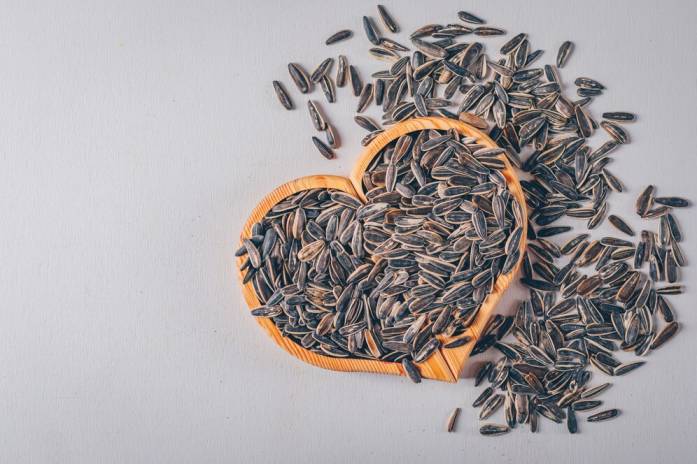
Sunflower seeds are high in vitamins B, E, and selenium. Sunflower seeds, with their golden colour and nutty flavour, are not only a popular snack but also a great source of nutrition and health benefits. These seeds, derived from the colourful sunflower plant. Let’s take a look at the bright world of sunflower seeds and discover the incredible health benefits they provide:
- Enrichment in Vitamin E: The vitamin E content of sunflower seeds is well known. Vitamin E is a powerful antioxidant that protects cells from oxidative stress, thereby preventing cellular damage and promoting overall health.
- Skin Health and Radiance: Sunflower seeds’ antioxidant capabilities play an important part in supporting skin health. Vitamin E helps in the maintenance of skin, the reduction of wrinkles, and the appearance of a youthful complexion.
- Cardiovascular Health: Sunflower seeds include beneficial fats, including monounsaturated and polyunsaturated fats, which contribute to heart health by regulating cholesterol levels. These fats help to keep blood vessels healthy and lower the risk of cardiovascular disease.
- Immune Boost: Sunflower seeds include important elements such as selenium and zinc, which are required for a healthy immune system. These minerals help immune cells operate properly and provide protection against infections and diseases.
- Enhancement of Mood: Sunflower seeds also contain tryptophan, linked to mood control and overall well-being. Consuming sunflower seeds may help you have a better mood and emotional equilibrium.
- Snacks High in Nutrients: Sunflower seeds are a nutrient-dense snack. Their combination of healthy fats, protein, and fibre might help you feel full and energised in between meals.
- Regulation of Inflammation: Sunflower seeds include phytosterols, which are anti-inflammatory plant chemicals. These substances can help to reduce chronic inflammation and improve overall health.
Conclusion
Each variety of seed, from chia seeds to sunflower seeds, flax seeds to sesame seeds, offers a unique collection of nutrients and benefits that are unique from those offered by the other types of seeds. These seeds not only contribute a unique texture and flavour, but they also provide vital nutrients that contribute to a lifestyle that is focused on health and physical activity. The availability of these seeds supports this lifestyle. It is possible for us to start on a journey of sustenance, vitality, and well-being that is inspired by the enormous benefits that nature’s seed gems generously provide if we make seeds a part of our daily routines.
Disclaimer: The intention of this article is simply to share information and promote awareness. It is not meant to substitute for professional medical advice.
FAQs (Frequently Asked Questions)
Q. What exactly are seeds, and why are they thought to be healthy?
Seeds are plant reproductive units that contain all of the nutrients required to promote the creation of new plants. Many seeds are high in critical elements such as healthy fats, fibre, protein, vitamins, and minerals, making them an important part of a well-balanced diet.
Q. What are some examples of common types of health benefits from seeds?
Chia seeds, flax seeds, sunflower seeds, pumpkin seeds, sesame seeds, and hemp seeds are all examples of healthful seeds. Each variety has its own nutritional profile as well as potential health benefits.
Q. Are seeds good for digestion and gut health?
Yes, many seeds are high in dietary fibre, which aids digestion by encouraging regular bowel movements and promoting a healthy gut microbiota. Chia and flax seeds are well-known for their high fibre content.
Q. Are seeds a good source of plant protein?
Chia, hemp, and pumpkin seeds are all good sources of plant-based protein. Including these seeds in your diet will help you reach your protein requirements, especially if you are a vegetarian or vegan.
Q. How can seeds help your heart health ?
Seeds rich in omega-3 fatty acids, such as chia, flax, and sunflower seeds, have been associated with reduced inflammation, improved cholesterol levels, and overall heart health.
Q. Can seeds help with blood sugar control?
Yes, some seeds, such as chia seeds, contain soluble fibre that can decrease sugar absorption and help manage blood sugar levels. Individuals with diabetes or those trying to stabilise their blood sugar may benefit from this characteristic.
Q. Can I eat too many seeds?
While seeds are nutrient-dense and helpful, eating too many of them might cause an imbalance in your diet. Moderation is essential, and it is best to consume a range of nutrient sources for a well-rounded diet.
Q. Is there anything to be concerned about in terms of allergies or sensitivities?
Certain seeds, notably sesame seeds and nuts, may cause allergies or sensitivities in some people. It’s critical to be aware of any sensitivities and to seek medical advice if you have any concerns.

